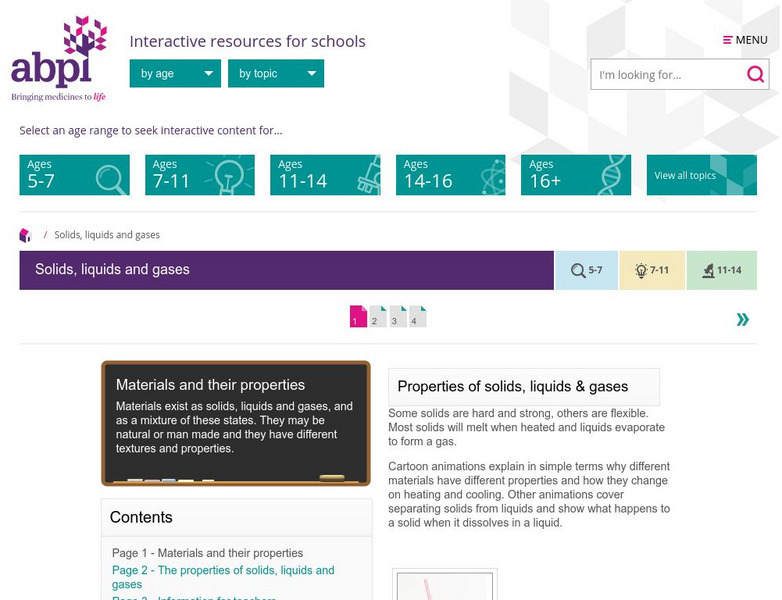Hi, what do you want to do?
Curated OER
Introduction to the Periodic Table of Elements
Students explain how the elements are arranged in the periodic table. In this chemistry instructional activity, students determine the subatomic particles for certain elements. They research the physical and chemical properties of an...
Curated OER
The Water Cycle--Using Inspiration Software
Third graders describe and label the water cycle, and list how water changes from one form to another; students use Inspiration Software to label a blank water cycle diagram.
Curated OER
Models of Planets
In this planet models learning exercise, students use the radius of a given planet and its mass to answer questions using a model of a planet with a given radius. They determine the volume of the planet's inner core, the volume of its...
Curated OER
Water 2: Disappearing Water
Students will observe the amount of water in an open container over time and also examine the amount of water in a closed container over time. They then will compare and contrast the sets.
Curated OER
Funny Putty
Students study that colloids are mixtures which display the properties of more than one of these states.
Curated OER
Wind
Fourth graders watch an experiment that demonstrates the causes of wind. They design and make an original weather craft.
Curated OER
Coefficient of Kinetic Friction and Surface Area
Students investigate coefficient of friction with respect to surface area and applied force in contact with the sliding force.
Curated OER
Float or Sink?
Students examine why some objects float while others do not. They place various objects in water to observe their floating capability. Students record the object, its weight, and if the object floated. They construct a graph plotting...
Curated OER
Chem Word Search Puzzle
In this chemistry terminology worksheet, students review and discuss nineteen terms associated with chemistry and then locate and circle each term in a word search puzzle.
Curated OER
Definition of Science Terms
In this water vocabulary worksheet, students read and learn 12 words that pertain to water and the water cycle. Each word and definition is printed on a separate page in a snowflake shape.
Curated OER
Carbon-14 Dating
In this carbon dating worksheet, students write and illustrate a comic strip describing the entire process of C-14 dating. Then students complete 6 short answer and 2 fill in the blank questions.
Curated OER
The Lorax
Students read The Lorax and discuss how human actions can affect the environment. They conduct a simple experiment to see how much air pollution is in the air that they breathe.
Curated OER
Comparing Properties of Elements & Compounds
In this elements and compounds worksheet, students review the physical properties of different compounds and elements using websites for information. This worksheet has 1 graphic organizer and 1 short answer question.
Curated OER
Where My Peeps At?
Students conduct a series of activity that demonstrates Charles' and Boyle's Law. For this chemistry lesson, students determine the relationship among pressure, volume and temperature. They solve problems using mathematical equation.
Curated OER
Making Sense of Density
Pupils identify the concepts of density, mass, and volume that define the property of a substance. They also determine that the properties of materials, such as, density and volume, can be compared and measured by using rulers, balances,...
The Association of the British Pharmaceutical Industry
Abpi: Solids, Liquids, and Gases
Students learn about solids, liquids, and gases in this interactive slide show. Animated cartoon characters explain concepts having to do with properties of matter. A self-checking quiz follows the lesson.
Chiral Publishing
Chiral Publishing: An Introduction to Chemistry: Solids, Liquids, and Gases: Audio Book
An interactive guide to the basics of solids, liquids, and gases. Wonderful pictures show the makeup of each and how the particles move in these states of matter.
Ducksters
Ducksters: Kids Science: Solid, Liquid, Gas
Kid's learn about the science of states of matter. Solids, liquids, gases, and even plasma.
University Corporation for Atmospheric Research
Ucar: Just a Phase: Water as a Solid, Liquid, and Gas
This site helps students construct a model of the arrangement of water molecules when present as solid, liquid or gas. Includes background information, lesson plans, links to standards and assessment ideas.
Concord Consortium
Concord Consortium: Stem Resources: States of Matter
Using simulations observe what solids, liquids, and gases look like at the atomic scale. After observing the different states of matter at their atomic level, students will be able to conclude about the forces and attractions that exist...
PBS
Pbs Learning Media: States of Matter Fitness Lesson Plan
In this instructional activity, students use their science knowledge and apply it using physical activity! Learning about the stages of matter, solid, liquid and gas, students perform an exercise for each as the teacher calls out an...
University of Colorado
University of Colorado: Ph Et Interactive Simulations: States of Matter
Watch different types of molecules form a solid, liquid, or gas. Add or remove heat and watch the phase change. Change the temperature or volume of a container and see a pressure-temperature diagram respond in real time. Relate the...
University of Colorado
University of Colorado: Ph Et Interactive Simulations: University of Colorado: States of Matter: Basics
An interactive simulation will heat, cool and compress atoms and molecules. Watch as they change between solid, liquid and gas phases. Recognize that different substances have different properties which will affect the temperatures for...




























